I am a Doctor and Here's How to Tell You Have High Blood Pressure — Eat This Not That - Eat This, Not That
High blood pressure, or hypertension, is a serious yet common condition that affects an alarming number of people. According to the Centers for Disease Control and Prevention, "Nearly half of adults in the United States (47%, or 116 million) have hypertension, defined as a systolic blood pressure greater than 130 mmHg or a diastolic blood pressure greater than 80 mmHg or are taking medication for hypertension." To make the situation worse, the CDC says "Only about 1 in 4 adults (24%) with hypertension have their condition under control," and many don't even realize they have high blood pressure because there's often no signs.
The Mayo Clinic states, "Most people with high blood pressure have no symptoms, even if blood pressure readings reach dangerously high levels. You can have high blood pressure for years without any symptoms. A few people with high blood pressure may have:
-Headaches
-Shortness of breath
-Nosebleed
However, these symptoms aren't specific. They usually don't occur until high blood pressure has reached a severe or life-threatening stage."
If left untreated hypertension can cause major health complications like heart disease and stroke. The CDC says, "In 2020, more than 670,000 deaths in the United States had hypertension as a primary or contributing cause." Knowing who is at risk, how to lower blood pressure and warning signs can be life-saving. Eat This, Not That! Health spoke with experts who share what to know about hypertension and how to tell if you have it. Read on—and to ensure your health and the health of others, don't miss these Sure Signs You've Already Had COVID.
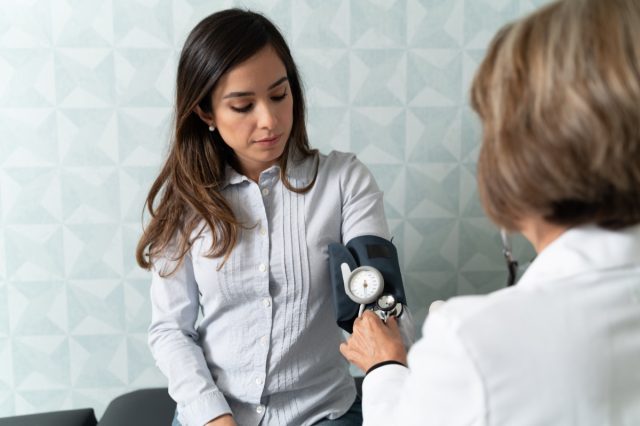
Dr. Jose Mayorga MD, executive director, UCI Health Family Health Centers tells us, "High blood pressure causes the heart to work harder. Although our heart is a special muscle, this is not your bicep. You do not want it to grow big and bulky because it pumps blood inefficiently putting you at risk for heart attacks, heart failure, and strokes if left uncontrolled.I like to explain high blood pressure to my patients in this matter. If you use a garden and do not put your thumb over the nozzle, water flows very nicely, smoothly, and with little pressure. Once you put your finger over the nozzle, what happens? The pressure increases, water sprays out faster with more force. This is what is happening when you have high blood pressure. All your internal organs – from your eyes to your brain to your kidneys – are getting hit with this force. Overtime, this causes damage and, in some cases, irreversible damage that can lead to blindness, strokes, and even kidney failure. In fact, the number one cause of kidney failure is due to hypertension (a close second is diabetes)."
Dr. Jacob Hascalovici MD, PhD Clearing Chief Medical Officer says, "High blood pressure can wear you out, contributing to fatigue and pain while also making it more likely you could have a heart attack or stroke. Untreated high blood pressure can also lead to problems with your kidneys, heart, mental health, and eyesight, among other things."
Lisa Richards, a nutritionist and author of the Candida Diet adds, "High blood pressure is so dangerous because it causes the heart to work harder as it pumps blood through the body. Because the heart is a muscle organ this extra work causes the left ventricle to thicken. This thickening places the individual at risk for heart disease, heart attack, and cardiac death. Elevated blood pressure can also lead to stroke. The pressure placed on the arteries that supply blood and oxygen to the brain can cause them to burst or become blocked, which results in stroke."
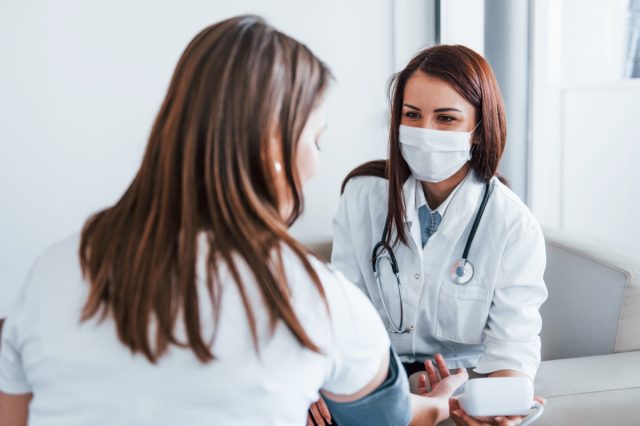
Dr. Mayorga emphasizes, "Everyone is at risk for high blood pressure. It is the number one chronic disease in the United States and now the world. Some individuals are at higher risk for developing high blood pressure such as those with unhealthy diets (excessive salt consumption, a diet high in fats, low intake of fruits and vegetables), poor/lack of exercise, tobacco users, excessive alcohol consumption, and being overweight or obese. Other individuals who are at risk are those with a family history of high blood pressure and elderly."
Dr. Hascalovici adds, "Anyone could develop high blood pressure, so everyone should regularly monitor their blood pressure with their doctor. Women, African American men, and people who consume a lot of sodium or remain sedentary are at a heightened risk of high blood pressure."
Richards tells us, "High blood pressure, hypertension, is more common among men than women at 55% versus 44% respectively, and higher among the African American community as a whole over caucasian and hispanic individuals. Aside from gender and race those who have certain lifestyle habits are also at a higher risk for developing hypertension. These habits include tobacco use, high alcohol consumption, sedentary, and an unhealthy diet – specifically a diet high in sodium. A family history of hypertension and being obese also place people at risk for high blood pressure."
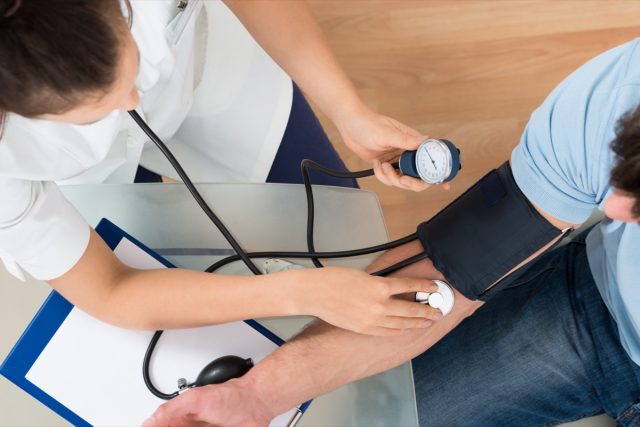
Dr. Mayorga says, "Typically, it is a medical condition that for the most part does not cause obvious symptoms…until it's too late. Many individuals walk around without knowing they have high blood pressure (Hypertension) for months and sometimes even years. This is why everyone should have a primary care doctor and have routine physicals. During these doctor visits you can undergo screening tests which include measuring your blood pressure, cholesterol, sugar, and obtaining vaccines to prevent serious infections."
Dr. Hascalovici explains, "It's possible to have high blood pressure and yet not be aware of it. That's why regular health checks are so important. If your doctor doesn't mention your blood pressure results, you should ask about them specifically."
The CDC says, "There's only one way to know if you have high blood pressure: Have a doctor or other health professional measure it. Measuring your blood pressure is quick and painless. Talk with your health care team about regularly measuring your blood pressure at home, also called self-measured blood pressure (SMBP) monitoring. High blood pressure is called the "silent killer" because it usually has no warning signs or symptoms, and many people do not know they have it."
Richards states, "High blood pressure is known as the silent killer because someone can have high blood pressure without any symptoms. This can lead to stroke or heart attack when high blood pressure goes unchecked or undiagnosed from being asymptomatic or disregarding symptoms. This is why it is important to have your blood pressure checked with your primary care provider or with a home measuring device. If signs do appear, symptoms of high blood pressure can often be disregarded or attributed to stress or other health conditions. Some of the most common indications of high blood pressure to look for include severe headaches, fatigue, vision changes, irregular heart beat, chest pain, difficulty breathing, and possibly nosebleeds."
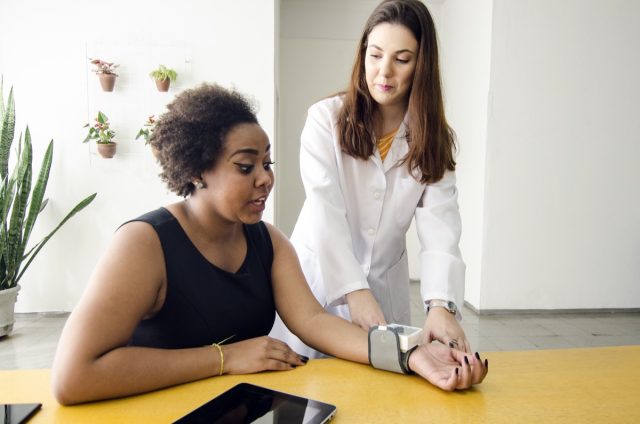
According to Richards, "Modifying lifestyle habits that contribute to high blood pressure is the best way to help lower your high blood; cut down or stop smoking, cut back on alcohol consumption, engage in even light to moderate physical activity, and integrate a diet rich in whole foods and low in sodium. Knowing your risk is important to lowering and / or preventing high blood pressure."
Dr. Mayorga states, "It seems very cliché but eating healthy and exercising is a great way to lower high blood pressure. Regular exercise or physical activity can help lower high blood pressure. If your job requires that you do extraneous activity this may not be enough because our bodies are very efficient and will get accustomed to routines. Therefore, it won't burn more calories. If you do the same activity every day it won't necessarily equate to added weight loss especially if you have a poor diet. This is why you should still make time to do other physical activity.
Other ways to prevent high blood pressure is eating a diet rich in whole grains, fruits, vegetables, and low in saturated fat and cholesterol. Studies suggest this can lower high blood pressure by up to 11 mm Hg! Furthermore, losing 5-10 pounds can manage or prevent high blood pressure in many individuals who are overweight (a BMI >/= 25). Some data suggests that even losing 2.2 pounds of weight can reduce your blood pressure by 1 mmHg."
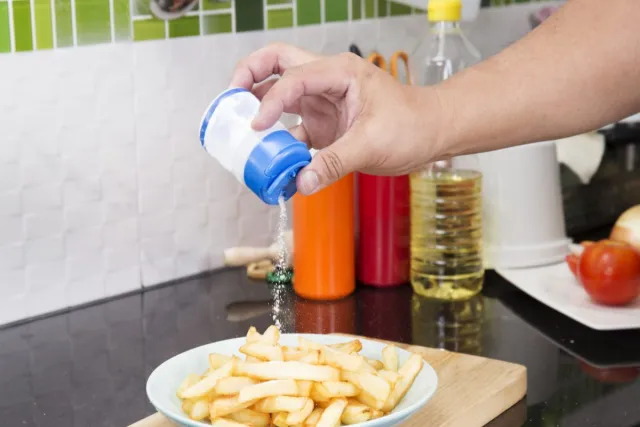
Dr. Hascalovici explains, "Eat less salt. Salt drives up your blood pressure because it encourages your body to retain water, which puts more stress on your veins. A typical American way of eating, unfortunately, makes it easy to eat a bit too much salt. Cutting your daily salt intake by even a pinch can help, though. To help even more, do your own cooking when possible, using flavorful spices instead of salt, and steer clear of heavily processed foods, fast food, and heavily salted things when you can."
Dr. Fernando Elijovich, a professor of medicine at Vanderbilt University tells the American Heart Society, "Within 30 minutes of eating excess salt, your blood vessels' ability to dilate is impaired. The damage from persistent high blood pressure shows up down the road, in the form of heart attacks, strokes and other problems." Dr. Cheryl Laffer, a professor of medicine at Vanderbilt University in Nashville, Tennessee also tells AHS, "The good news is the benefits of cutting back on excess salt also show up quickly. If you significantly reduce how much salt you eat, your blood pressure goes down within hours or days.And keeping it low can make a significant long-term difference. "In the U.K., they actually had a nationwide effort to reduce salt in commercial foods," she said. "Within a couple of years, they had reduced the numbers of heart attacks and other bad outcomes. And that was pretty striking."
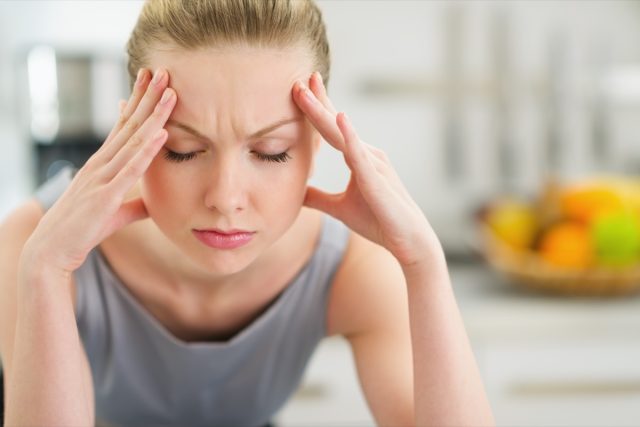
Dr. Hascalovici says, "You should do what you can to keep stress low. When you're stressed, your body produces hormones to help deal with a possible emergency or whatever is stressing you, meaning your heart typically beats faster and more stress hormones circulate. Over time, high stress can lead to high blood pressure. Exercise, sleep, good friends, doing meaningful things, and taking quiet moments to slow down can all help manage stress. Some people do meditation, get massages, take walks in nature, or practice mind-body techniques to lower their stress levels."
According to the Mayo Clinic, "Reducing your stress level might not directly lower your blood pressure over the long term. But using strategies to manage your stress can help improve your health in other ways. Mastering stress management techniques can lead to healthy behavior changes — including those that reduce your blood pressure. There are many options for managing stress. For example:
- Simplify your schedule. If you always feel rushed, take a few minutes to review your calendar and to-do lists. Look for activities that take up your time but aren't very important to you. Schedule less time for these activities or eliminate them completely.
- Breathe to relax. Taking deep and slow breaths can help you relax.
- Exercise. Physical activity is a natural stressbuster. Just be sure to get your doctor's OK before starting a new exercise program, especially if you've been diagnosed with high blood pressure.
- Try yoga and meditation. Yoga and meditation strengthen your body and help you relax. These techniques also may lower your systolic blood pressure by 5 millimeters of mercury (mm Hg) or more."


Comments
Post a Comment